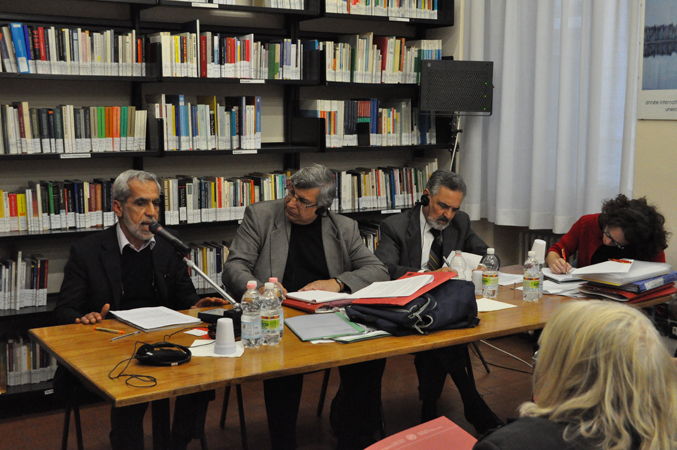European Commission against racism and intolerance (ECRI) meets civil society representatives at the Human Rights Centre

On 26 November 2010 the latest visit in Italy of the delegation of the European Commission against racism and intolerance (ECRI) ended. This independent monitoring body, established in 2002 by the Council of Europe, is specialised in combating every form of racism, xenophobia, anti-Semitism and intolerance, with the aim of human rights protection.
ECRI is preparing the fourth Report on Italy which will contain a deep analyses of the situation of racism and intolerance in our country, as well as recommendations on how to solve the problems detected.
As usual, the delegation had meetings both with public authorities and civil and academic society. Official meetings in Rome, Venice and Naples have been promoted and coordinated by the Comitato interministeriale dei diritti umani del Ministero degli Affari Esteri (Interdepartmental Committee for human rights of Foreign Affairs Ministry of the Italian Republic).
The Interdepartmental Centre on Human Rights and the Rights of Peoples of the University of Padua, on the purpose of ECRI Secretariat, contributed to organise a consultation with civil society organisations operating in the Region of Veneto, which took place at Human Rights Centre during the afternoon of Wednesday 24 November.
The Director of Human Rights Centre, prof. Marco Mascia, saluted the members of ECRI delegation and participants, remembering the fruitful collaboration going on with the Council of Europe for what concerns the setting up of a network of non-jurisdictional and independent structures for the protection of human rights, with a particular regard to non-EU member-states of the Council of Europe. During the last two years, the Human Rights Centre and the Council of Europe have jointly organised 14 international seminars in Padua, Russia and Hungary.
The representatives of the major associations operating in the Region of Veneto have resumed orally the content of precise dossiers given to ECRI delegation:
Leonardo Arnau, President of Giuristi Democratici (Democratic Jurists), Padua branch, National executive member; Bruno Baratto, Contact person for Dossier Immigrazione 2010 (Immigration dossier) Caritas-Migrantes, Treviso; Gabriele Brunetti, Officer for Immigrations of CISL Veneto (Italian Confederation of Workers' Trade Union, Veneto branch), Member of Consulta Regionale Immigrazione (Immigration regional council), Vicenza; Giancarlo Cavallin, CGIL Treviso (Italian Labour General Confederation, Treviso branch) member of Coordinamento "Cittadinanza Attiva della Marca" (Committee "Active Citizenship of Treviso province") and of Associazione per l'autogestione dei servizi e la solidarietà - AUSER "Cittadini del mondo", Treviso (Association for collective managment of services and solidarity – AUSER "World citizens"); Matteo Danese, Centro Studi Immigrazione, CESTIM (Centre of studies on Immigration), Verona; Marco Ferrero, Regional officer of ACLI (Association of Italian Christian workers) for Immigration; Abdallh Kehzraji, Deputy President of Regional council for immigration; Matteo Mascia, Director of Associazione Diritti Umani-Sviluppo Umano (Association Human rights-Human development), Padova; Renata Paolucci, President of Associazione Opera Nomadi di Padova (Association for Nomad people of Padua); Reza Rashidy, Coordinator of Venetian project sponsored by UNAR (National bureau against racial discrimination), Venezia; Enrico Varali, Regional coordinator of Associazione per gli Studi Giuridici sull'Immigrazione, ASGI-Veneto (Association for Juridical studies on immigration, Veneto branch).
In addition, some academic participated in the discussion: Paola Degani, professor of Public policies and Human rights at University of Padua; Paolo De Stefani, professor of International Case Law of Human rights and National instution for human rights at University of Padua; Vincenzo Pace, professor of Sociology of Religions at University of Padua; Antonio Papisca, UNESCO Chair "Human Rights, Democracy and Peace" of the University of Padua; Devi Sacchetto, professor of Sociology of Economic and Labour Processes; Fabio Perocco, professor of Sociology of migrations and intercultural relations, Officer of Laboratorio Immigrazione (Immigration lab) of Ca' Foscari University of Venice; Valentina Zonca, Donatella Greco, Nicolò Degiorgis, team of research Trieste Multiculturale. Comunità e Linguaggi di integrazione (Triest multicultural community and integration languages) at Univeristy of Trieste.
The ECRI delegation asked participants to provide punctual answers on some relevant and problematic aspects of thr situation in the Region of Veneto.
Amongst the themes discussed: irregular immigrants welcoming and juridical status; public services access (school, accommodation and health care); discrimination inside labour market; accidents racism-related; irregular immigrants and crime of illegal immigration; asylum seekers; situation of Roma-Sinti people and muslims communities; protection of trafficked persons; media behaviour; measures regulating the release of the permit to stay; educational and awareness rising initiatives.
The meeting finished with the complete satisfaction of the ECRI delegation for the information and the recommendations received.

